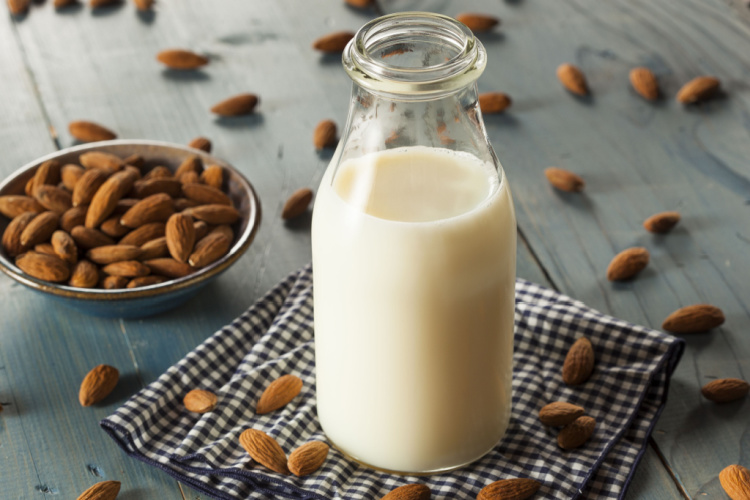Why Drinking Almond Milk Might Benefit You
Alternatives to cow’s milk have been rising in popularity in recent years. There are so many to choose from nowadays and one excellent option is almond milk. It has some great potential health benefits, a great shelf life, and is simple to make. Let’s look at its properties and how it compares to the other milk substitutes on the market.

The History Of Almond Milk
Almond milk has been around since the Middle Ages. At the time, they lacked modern refrigeration and cow’s milk spoiled very quickly. Almond milk was easy to make, didn’t need refrigeration, and lasted longer than cow’s milk. It was also plant-based so for many Christians during the era, it was a great supplement to their diet during Lent when dairy was not allowed. They also had folklore that led them to believe that it could help increase sperm production and prevent drunkenness if consumed the night before consuming alcohol. These beliefs boosted its popularity.
In the early 2000s, almond milk lost some popularity and was outranked by cow’s milk and soy milk. As the drawbacks of soy milk (that we’ll discuss later on) became more apparent and dairy allergies and intolerances were better understood, almond milk regained some upward momentum. In 2014, it accounted for 60% of plant-based milk sales and accounts for about 4% of overall milk sales today.

How Almond Milk Is Made
As stated above, almond milk is very easy to make. You just need to plan a bit. You soak almonds in a bowl of water for 24-48 hours. Then rinse the almonds and then blend them with water for a couple of minutes. From there, put the mixture into a cheesecloth over a bowl and squeeze out all the moisture. That moisture is your almond milk. It’s that simple. You can sweeten it to taste if you prefer. It’ll keep in the fridge for about a week.

Health Benefits Of Almond Milk
So, what is so great about almond milk? Lots. It has about half a day’s recommended dose of vitamin E, which is a great antioxidant. It also has about 20% of your daily calcium dose and 10% of your daily recommended dose of vitamin A. If it is store-bought, it will also contain about a quarter of the daily dose of vitamin D. Some people worry that switching from cow’s milk will cause a massive drop in calcium and vitamin D consumption. Almond milk doesn’t contain as much as cow’s milk, but it is still a good source of both.
In addition to the nutrients, almond milk has other potential health benefits. It has fewer calories per serving than many other milks and can help aid in weight loss plans. Some research suggests it may help prevent or manage some cancers.
Almond milk is full of good fat–mono- and polyunsaturated–so it can potentially help protect against coronary heart disease and reduce the risk of metabolic syndrome. The vitamin E in the milk also may help slow Alzheimer’s symptoms over time.

How Almond Milk Compares To Other Milk
We know almond milk isn’t the only milk on the market. Not even close. Let’s see how they all compare.
Cow’s Milk
Cow’s milk has historically been the most popular. It is full of many nutrients, most notably calcium and vitamin D, and has health benefits. Many people are allergic to dairy or intolerant to the lactose in the milk, causing digestive issues.
Goat Milk
Goat milk is easier to digest and contains less lactose than cow’s milk. Though if you have a dairy allergy, you may still be allergic to goat milk. It is also full of nutrients and health benefits. It generally costs more than other milk.
Soy Milk
Soy milk burst onto the scene early on and remained at the top of the list for healthy milk alternatives for years. Recently, it has been losing popularity. Much of the soy produced in the U.S. is genetically modified and that can be a turn-off to some. Soy is also a phytoestrogen. People with histories of hormone-sensitive cancers may have to steer away from soy milk because it mimics the effects of estrogen in the body.
Oat Milk
Oat milk is made similarly to almond milk. Oats and water are blended and strained to make the milk. It’s a good source of many nutrients, fiber, and protein. Each serving has a higher calorie count than almond milk. It is naturally gluten-free.
Rice Milk
Rice milk is very similar in production to almond and oat milk. Beyond that, however, it does not have a lot of health benefits. There is also a risk of arsenic poisoning if it is consumed too much. Moderation is best for rice milk.
Coconut Milk
Finally, coconut milk is another great alternative. It has lauric acid in addition to a good amount of nutrients. Lauric acid may be able to help fight infections and provide energy. If you are drinking a full-fat version, it can be calorically dense, but may, in moderation, help protect against heart disease and build muscle.

Don’t Sleep On Almond Milk
Almond milk is a great source of nutrition, provides many potential health benefits, is easy to make, and has been around for centuries. It’s a great option for a plant-based, dairy-free diet.
